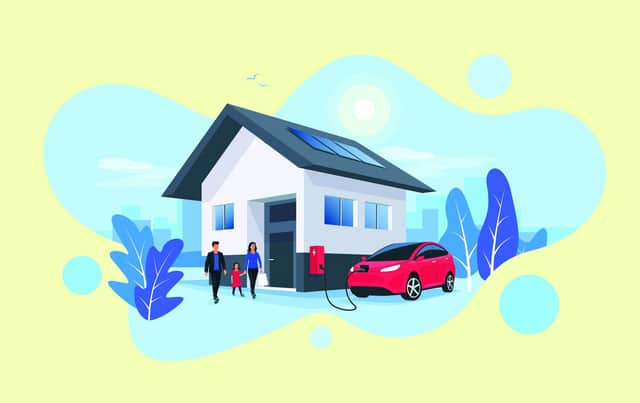Kirsty McLuckie on the cost of green living


Homeowners planning on staying in their properties long-term can make the calculation that the cost of solar panels, biomass boilers and ground or air-source heat pumps will pay for themselves in savings... eventually.
However, for those who are looking to move before that tipping point, the plus points of investing in such green measures are not so clear cut, at least financially.
Advertisement
Hide AdAdvertisement
Hide AdPaying thousands of pounds only to benefit the next owner isn’t enticing, but perhaps any eco measure could at least be expected to raise the value of the home by its cost if you sell in the short-term?
This time last year, I garnered the opinion of valuers and estate agents on whether or not replacing inefficient heating systems with green technologies would equal a resulting uptick in the valuation of a property. The answer, albeit anecdotal, was a resounding no.
One explained: “Most house hunters have sustainability quite low on their list of requirements.” He even suggested that some might be put off by unfamiliar technology.
But this week a survey of UK homeowners says attitudes are shifting. The research, from FJP Investment, shows we have started to prioritise sustainability in property ownership due to the energy price crisis.
The firm found that 44 per cent of respondents would be willing to pay more for a property with a high energy efficiency rating, with the figure jumping to 59 per cent among those aged 18-34.
The research showed the normalisation of remote work is a consideration, with many more concerned with the energy efficiency of their property in light of having to heat them throughout the day.
What is more, FJP’s study revealed that almost half believe that improving the energy efficiency of their property will future-proof its value. Recent data based on average property prices in England backs this up – raising a property’s EPC from a G to an A rating could increase the value of a property by 14 per cent.
Which, in terms of investment, is a better return than a shiny new kitchen is ever likely to be.
Advertisement
Hide AdAdvertisement
Hide AdAccording to the study, only a fifth of homeowners are prepared to purchase a property with poor energy efficiency and then make improvements themselves, which suggests that improving efficiency might be a wise investment however long you plan to stay in a home.
But cost remains a barrier. Jamie Johnson, chief executive of FJP Investment, said: “While the tax relief announced in the Spring Statement on solar panels, insulation and heat pumps is a step in the right direction, the measures don’t go far enough to solve the affordability issue facing many households who will find these energy incentives out of reach.
“Removing the affordability barriers to green renovations and sustainable home ownership needs to be at the forefront of the government’s agenda, who must work with the construction industry to ensure greater progress is made.”
- Kirsty McLuckie is property editor at The Scotsman